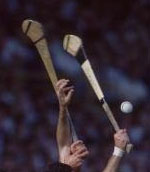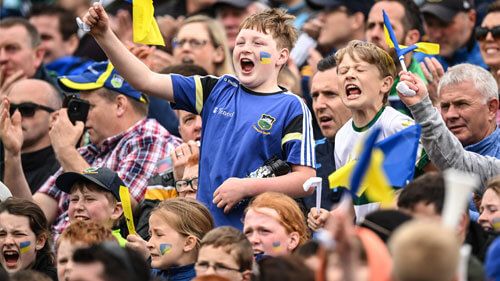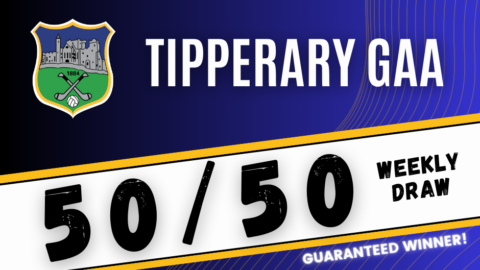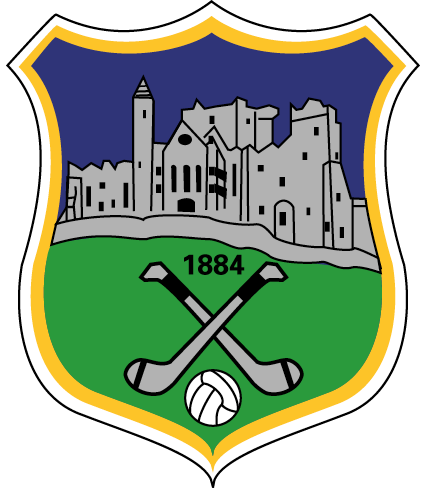The Celtic Challenge
By Fergus McGrath
Background
Despite the fact that hurling is considered to be of prehistoric origin and one of the oldest field games in the world it continues to be in a state of development. The game of hurling is widely played in a number of areas throughout Ireland but there are many other areas where it isn’t, with the latter outnumbering the former. In December 2015 a three year Hurling Development Action Plan was launched by the GAA’s Hurling Development Committee under the Chairmanship of Tipperary man and former coach to the Tipperary senior hurling team Paudie Oʼ Neill with the primary objective of increasing the number of opportunities that people of all ages across all counties have of playing the game of hurling.
The Action Plan contained 4 ‘pillars’ that spanned a range of different themes.
Pillar 1 – Games Opportunities
i.e. increasing the number of meaningful games opportunities.
Pillar 2 – Facilitating Coach Education
Pillar 3 – Organisational Effectiveness
i.e. improving planning and funding for hurling development initiatives.
Pillar 4 – Innovation and Promotion
i.e. supporting the hurling community through sharing best practice.
One of the actions of Pillar 1 was the establishment of an under 17 Development Programme which was called The Celtic Challenge. The Celtic Challenge is the GAA’s newest national hurling competition with an ethos of providing players nationwide with a meaningful programme of games and training inputs appropriate to their current needs and levels of development. It enables players to experience training regimes and game time at a high level on a national stage and it facilitates their ongoing development as hurlers.
The Celtic Challenge is designed for 16 and 17 year old players who are not participating in State Examinations during the months of May and June and in the case of some counties, including Tipperary, who are not on the county minor panel. In 2016, its inaugural year, a seven week programme of pre-scheduled games took take place between 4th May and 18th June – a time period designed to avoid interruption to club or county fixtures. 38 teams from 31 counties participated in the competition (it is hoped that 48 teams will take part next year) with 5 finals ultimately taking place in mid-June after a series of games consisting of group stages (teams were selected on a geographical and developmental basis), preliminary rounds and play offs. The trophies played for in the finals were named in memory of 5 of the 14 civilians who were shot dead by Crown forces in Croke Park on Bloody Sunday, 21st November 1920 namely Michael Hogan (aged 24), John William Scott (aged 14), William Robinson (aged 11), Jerome O’Leary (aged 10) and Michael Feery (aged 40).
Campaign
Tipperary’s representative in the 2016 Celtic Challenge consisted of a regional team called South Tipperary which comprised players from the west and south divisions. South Tipperary’s opponents in the initial group stage (Group A) were Carlow, South Kilkenny, Waterford City and South Wexford with an opening game away to Carlow on 4th May.
Despite opening slowly and being somewhat wasteful and lethargic in the first half South Tipperary put in a strong second half performance against a stiff wind to run out winners over a tenacious Carlow side on a score line of 3-11 to 0-12. A bye in the second round enabled a challenge game against North Cork to take place where South Tipperary’s display was a lot more fluid than anything produced previously. A comprehensive victory was achieved and some good individual performances were noted. The next competitive game was at home to a Waterford City side that had beaten Carlow by 15 points in round 2. On the night South Tipperary continued the form they had shown against North Cork and produced an impressive performance to record a 4-21 to 0-10 victory with Niall Hoctor’s scoring exploits (2-6 from play) catching the eye. Likewise the performances of Killian Hayde, Eoin McCormack, Stephen O’ Brien, Fiachra Scott, Paul O Heney, Andy Byrnes, Conal Donovan and Cathal Bourke.
A trip to New Ross was next to face South Wexford where the locals secured a deserved 3-15 to 1-14 victory. For South Tipperary this was a case of not playing to their potential but of being beaten by a talented and superior team on the night. A week later an opportunity to get the ship back on course arrived with a home game against a South Kilkenny team that had been putting up very big scores in previous rounds. The South Tipperary performance in the first half against South Kilkenny seemed to be a continuance of the malaise that appeared to set in against South Wexford and the scoreboard at half time did not make for pretty reading. South Kilkenny 4-8 South Tipperary 0-6.
Whereas the gauntlet was well and truly thrown down to the South Tipp lads in the first half it was about to be picked up shortly after the restart. Cathal Bourke opened the second half scoring with a pointed free for South Tipperary. Niall Hoctor followed with a goal for the home side following great build-up work by Bourke and Andy Byrnes. Bourke landed two more frees before South Kilkenny opened their second half scoring with a successfully converted free.
South Tipperary kept in touch with a pointed free from Bourke which was followed by two from play for the visitors. South Tipperary interchange player (substitute) Nathan Crowe, who was making an impression, pounced for his side’s second goal following a great run by Niall Hoctor and shortly afterwards Hoctor would goal himself not once but twice to leave his team two points adrift with ten minutes to go.
Bourke had another point from play for South Tipperary which was followed by two points from midfielder Andy Byrnes. With excitement at fever pitch and the game in the balance South Tipperary were awarded a penalty. Byrnes stepped up and showing great composure and no little skill rattled the net with a great strike. With two minutes of injury time to play South Tipperary were four points ahead having been fourteen points down at half time. South Kilkenny came looking for a late goal and in typical Kilkenny fashion it came. In the dying seconds of the game both teams continued to give it their all with the South Tipperary defence led by Michael Meaney and Fiachra Scott defending heroically. At the final whistle South Tipperary emerged victors by the narrowest of margins. South Tipperary 5-13 South Kilkenny 5-12.
At the end of the group stage South Tipperary, South Kilkenny and South Wexford were tied in first place of Group A but scoring difference dictated that for the next stage of the competition South Tipperary would progress to Division 2 ‘Corn John Scott’ with South Kilkenny and South Wexford progressing to Division 1 ‘Corn Michael Hogan’, Waterford City progressing to Division 3 ‘Corn William Robinson’ and Carlow progressing to Division 4 ‘Corn Jerome O’Leary’.
Kildare were South Tipperary’s next opponents and on a blistering hot day in Rathleague, Co. Laois Tipperary emerged victors on a score line of 5-17 to 2-15. A play off (semi-final) against Kerry in the Gaelic Grounds, Limerick was next on the agenda for the Tipp lads and sadly it was here that the journey ended. Having scored an accumulated total of 10 goals and 30 points in the previous two matches the South Tipperary firepower dried up against an impressive Kerry side who deservedly won on a score line of 1-15 to 0-7.
Whereas there were many sterling performances from the South Tipperary lads on the day and whereas the team was deservedly beaten by a very good Kerry outfit the observation – accurate or otherwise – was made afterwards that Kerry appeared to want the win more than South Tipperary; that they seemed to have more desire on the day.
Reflection
After this year’s Leinster senior hurling final where Kilkenny had a seven points victory over Galway having trailed by three at half time Kilkenny’s Richie Hogan was asked about the secret of Kilkenny’s desire and about the manner in which they seem to be so hungry for success year after year irrespective of how many titles they win. His response was interesting. “Desire is a personal trait”, he explained, “the players who have it are on the team, the players who don’t have it aren’t.” Although potentially reductionistic and undervaluing of the influence of team spirit on desire, Hogan makes a good point.
As coaches we would do well to ask ourselves whether we work adequately with our players on personal desire or its many monikers – hunger, passion, motivation, fight, intensity etc. – or whether we consider it to be a fixed trait impervious to cultivation and therefore undeserving of attention. And if personal desire is something that can be refined do we absolve ourselves of responsibility and leave it up to the individual players or do we intervene proactively, and if we intervene proactively how do, can, should, have and will we?
Attracting players to play for Tipperary is not the most difficult job in the world. Most players do not need to be encouraged to play. For many the experience of representing their county is its own incentive and they are attracted for direct experiential rewards such as excitement, personal competence, development, reward, recognition etc. In Psychology this motivation is referred to as intrinsic. Intrinsic motivation is the self-desire to seek out new things and new challenges, to analyse one’s capacity, to observe and to gain knowledge. Research has shown that for this type of motivation to occur the task at hand must be interesting, must provide optimum challenge, must involve feedback and must allow people to experiment with their own way of doing something. At county developmental level a challenge is to ensure that we are ticking these boxes for every individual panellist when it comes to the development of our elite players.
Finally and Importantly. . .
The management of the South Tipperary Celtic Challenge team would like to thank the Cahir, Golden-Kilfeacle and Clonoulty-Rossmore GAA clubs for the kind use of their facilities for training and matches. Likewise Dinny Maher (County Games Manager), & John O’Keeffe (Games Development Administrator) for their support. The management team would also like to thank Joe Bracken (Tipperary PRO), Ed Donnelly (Tipperary IT Committee), Francis Coughlan (West Tipperary PRO), Tipperary Mid-West radio station, Tipp FM radio station and the Nationalist newspaper for promoting our activities. Finally the management team would like to thank the players and their parents for their commitment and effort and to wish the players well in their future development.
The 2016 South Tipperary Celtic Challenge panel and management team were as follows:
Panel
Luke Delahunty (Moyle Rovers), Stephen O’Brien (Eire Og Annacarty), Donnacha Quirke (Clonoulty-Rossmore), Eoin McCormack (Knockavilla Kickhams), Paul O’Heney (Emly), Fiachra Scott (Ballingarry), Conor Leahy (Arravale Rovers), Andy Byrnes (Golden-Kilfeacle), Niall Heffernan (Golden Kilfeacle), Eoghan Brett (Mullinahone), Conal Donovan (Arravale Rovers), Cathal Bourke (Clonoulty-Rossmore), Fergus Halligan (Arravale Rovers), Nathan Crowe (Arravale Rovers), Niall Hoctor (St. Mary’s Clonmel), Killian Hayde (Golden Kilfeackle), Michael Meaney (Ballyneale), Ross Bonnar (Cashel King Cormacs), Jordan Hayes (Eire Og, Annacarty), Kevin Lawlor (Killenaule), Darren O’Dwyer (Arravale Rovers), Matthew Moroney (Arravale Rovers), Dean McMorrow (Clerihan), Jack Lyons (Ballyneale), Jack Lowry (Arravale Rovers), Conor O’Brien (Cahir), Colin Ryan (Cashel King Cormacs), Cormac Maher (Arravale Rovers), Josh Macken (Skeheenarinky), Aaron Ryan (Sean Treacy’s), Ciaran Quinn (Cashel King Cormacs).
Management Team
Declan Hickey (Skeheenarinky), Kevin Shelly (Ballingarry), Eddie Moroney (Arravale Rovers), Fergus McGrath (St. Mary’s Clonmel).






















